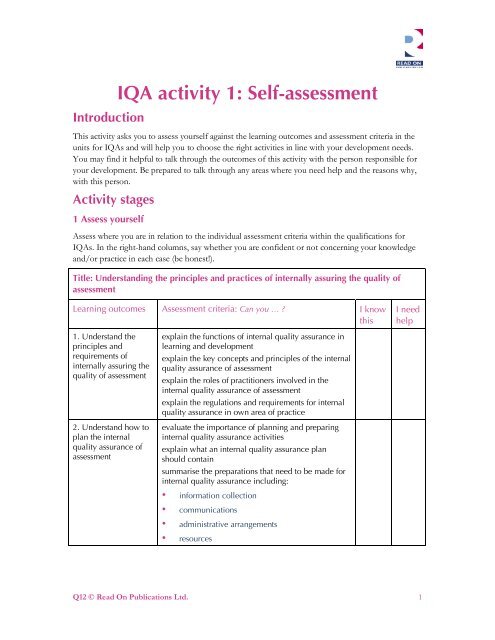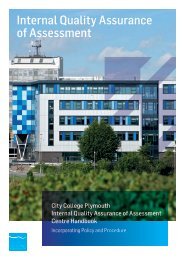Q12-product
Create successful ePaper yourself
Turn your PDF publications into a flip-book with our unique Google optimized e-Paper software.
Introduction<br />
IQA activity 1: Self-assessment<br />
This activity asks you to assess yourself against the learning outcomes and assessment criteria in the<br />
units for IQAs and will help you to choose the right activities in line with your development needs.<br />
You may find it helpful to talk through the outcomes of this activity with the person responsible for<br />
your development. Be prepared to talk through any areas where you need help and the reasons why,<br />
with this person.<br />
Activity stages<br />
1 Assess yourself<br />
Assess where you are in relation to the individual assessment criteria within the qualifications for<br />
IQAs. In the right-hand columns, say whether you are confident or not concerning your knowledge<br />
and/or practice in each case (be honest!).<br />
Title: Understanding the principles and practices of internally assuring the quality of<br />
assessment<br />
Learning outcomes Assessment criteria: Can you … ? I know<br />
this<br />
I need<br />
help<br />
1. Understand the<br />
principles and<br />
requirements of<br />
internally assuring the<br />
quality of assessment<br />
2. Understand how to<br />
plan the internal<br />
quality assurance of<br />
assessment<br />
explain the functions of internal quality assurance in<br />
learning and development<br />
explain the key concepts and principles of the internal<br />
quality assurance of assessment<br />
explain the roles of practitioners involved in the<br />
internal quality assurance of assessment<br />
explain the regulations and requirements for internal<br />
quality assurance in own area of practice<br />
evaluate the importance of planning and preparing<br />
internal quality assurance activities<br />
explain what an internal quality assurance plan<br />
should contain<br />
summarise the preparations that need to be made for<br />
internal quality assurance including:<br />
• information collection<br />
• communications<br />
• administrative arrangements<br />
• resources<br />
<strong>Q12</strong> © Read On Publications Ltd. 1
Learning outcomes<br />
Assessment criteria<br />
Can you … ?:<br />
I know<br />
this<br />
I need<br />
help<br />
3. Understand<br />
techniques and criteria<br />
for monitoring the<br />
quality of assessment<br />
internally<br />
evaluate different techniques for sampling evidence of<br />
assessment including use of technology<br />
explain the appropriate criteria to use for judging the<br />
quality of the assessment process<br />
4. Understand how to<br />
internally maintain<br />
and improve the<br />
quality of assessment<br />
summarise the types of feedback support and advice<br />
that assessors may need to maintain and improve the<br />
quality of assessment<br />
explain standardisation requirements in relation to<br />
assessment<br />
explain relevant procedures regarding disputes about<br />
the quality of assessment<br />
5. Understand how to<br />
manage information<br />
relevant to the internal<br />
quality assurance of<br />
assessment<br />
evaluate requirements for information management,<br />
data protection and confidentiality in relation to the<br />
internal quality assurance of assessment<br />
6. Understand the<br />
legal and good<br />
practice requirements<br />
for the internal quality<br />
assurance of<br />
assessment<br />
evaluate legal issues, policies and procedures relevant<br />
to the internal quality assurance of assessment,<br />
including those for health, safety and welfare<br />
evaluate different ways in which technology can<br />
contribute to the internal quality assurance of<br />
assessment<br />
explain the value of reflective practice and continuing<br />
professional development in relation to internal<br />
quality assurance<br />
evaluate requirements for equality and diversity and,<br />
where appropriate, bilingualism, in relation to the<br />
internal quality assurance of assessment<br />
Title: Internally assure the quality of assessment<br />
Learning outcomes<br />
Assessment criteria<br />
Can you … ?:<br />
I can<br />
do this<br />
I need<br />
help<br />
1. Be able to plan the<br />
internal quality<br />
assurance of<br />
assessment<br />
plan monitoring activities according to the<br />
requirements of own role<br />
make arrangements for internal monitoring activities<br />
to assure quality<br />
<strong>Q12</strong> © Read On Publications Ltd. 2
Learning outcomes<br />
Assessment criteria<br />
Can you … ?:<br />
I can<br />
do this<br />
I need<br />
help<br />
2. Be able to internally<br />
evaluate the quality of<br />
assessment<br />
carry out internal monitoring activities to quality<br />
requirements<br />
evaluate assessor expertise and competence in<br />
relation to the requirements of their role<br />
evaluate the planning and preparation of assessment<br />
processes<br />
determine whether assessment methods are safe, fair,<br />
valid and reliable<br />
determine whether assessment decisions are made<br />
using the specified criteria<br />
compare assessor decisions to ensure they are<br />
consistent<br />
3. Be able to internally<br />
maintain and improve<br />
the quality of<br />
assessment<br />
provide assessors with feedback, advice and support,<br />
including professional development opportunities,<br />
which help them t maintain and improve the quality<br />
of assessment<br />
apply procedures to standardise assessment practices<br />
and outcomes<br />
4. Be able to manage<br />
information relevant to<br />
the internal quality<br />
assurance of<br />
assessment<br />
apply procedures for recording, storing and reporting<br />
information relating to internal quality assurance<br />
follow procedures to maintain confidentiality of<br />
internal quality assurance information<br />
5. Be able to maintain<br />
legal and good<br />
practice requirements<br />
when internally<br />
monitoring and<br />
maintaining the quality<br />
of assessment<br />
apply relevant policies, procedures and legislation in<br />
relation to internal quality assurance, including those<br />
for health, safety and welfare<br />
apply requirements for equality and diversity and,<br />
where appropriate, bilingualism, in relation to internal<br />
quality assurance<br />
critically reflect on own practice in internally assuring<br />
the quality of assessment<br />
maintain the currency of own expertise and<br />
competence in internally assuring the quality of<br />
assessment<br />
<strong>Q12</strong> © Read On Publications Ltd. 3
This unit only applies to Lead IQAs:<br />
Title: Plan, allocate and monitor work in own area of responsibility<br />
Learning outcomes<br />
Assessment criteria<br />
Can you … ?:<br />
I can<br />
do this<br />
I need<br />
help<br />
1. Be able to produce<br />
a work plan for own<br />
area of responsibility<br />
explain the context in which work is to be undertaken<br />
identify the skills base and the resources available<br />
examine priorities and success criteria needed for the<br />
team<br />
produce a work plan for own area of responsibility<br />
2. Be able to allocate<br />
and agree<br />
responsibilities with<br />
team members<br />
identify team members’ responsibilities for identified<br />
work activities<br />
agree responsibilities and SMART (specific,<br />
measurable, achievable, realistic and time-bound)<br />
objectives with team members<br />
3. Be able to monitor<br />
the progress and<br />
quality of work in own<br />
area of responsibility<br />
and provide feedback<br />
identify ways to monitor progress and quality of work<br />
monitor and evaluate progress against agreed<br />
standards and provide feedback to team members<br />
4. Be able to review<br />
and amend plans of<br />
work for own area of<br />
responsibility and<br />
communicate changes<br />
review and amend work plan where changes are<br />
needed<br />
communicate changes to team members<br />
2 Identify areas for development and activities to help you<br />
Use the table below to make a note of any of the areas where you need further help and<br />
development; then choose the activities linked to these areas that will help you. (Refer to the<br />
guidance document on using the activities for the links between activities and the learning outcomes<br />
and assessment criteria.)<br />
I need further areas for help with …<br />
Activity<br />
<strong>Q12</strong> © Read On Publications Ltd. 4
What the standards say<br />
IQA units<br />
Unit title Learning outcome Assessment criteria<br />
Internally assure the quality<br />
of assessment<br />
5. Be able to maintain legal and<br />
good practice requirements<br />
when internally monitoring and<br />
maintaining the quality of<br />
assessment<br />
5.3 Critically reflect on own<br />
practice in internally<br />
assuring the quality of<br />
assessment<br />
5.4 Maintain the currency of<br />
own expertise and<br />
competence in internally<br />
assuring the quality of<br />
assessment<br />
<strong>Q12</strong> © Read On Publications Ltd. 5






